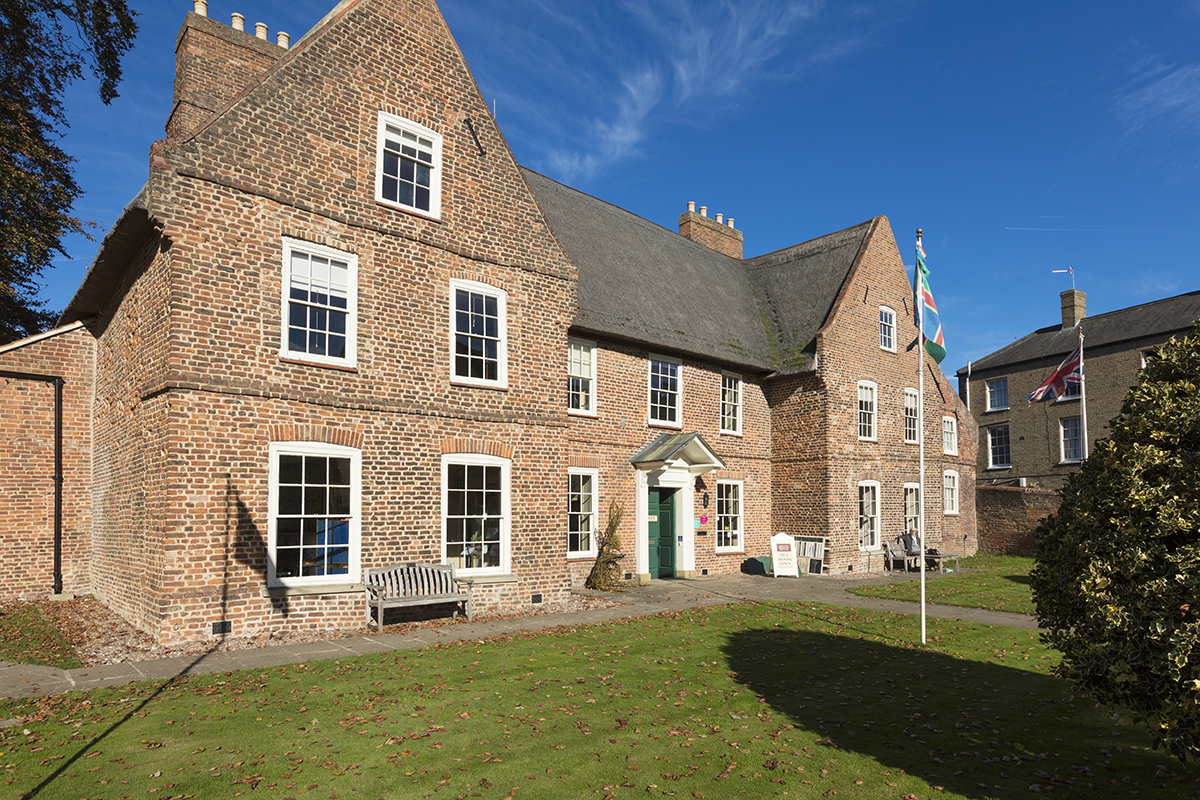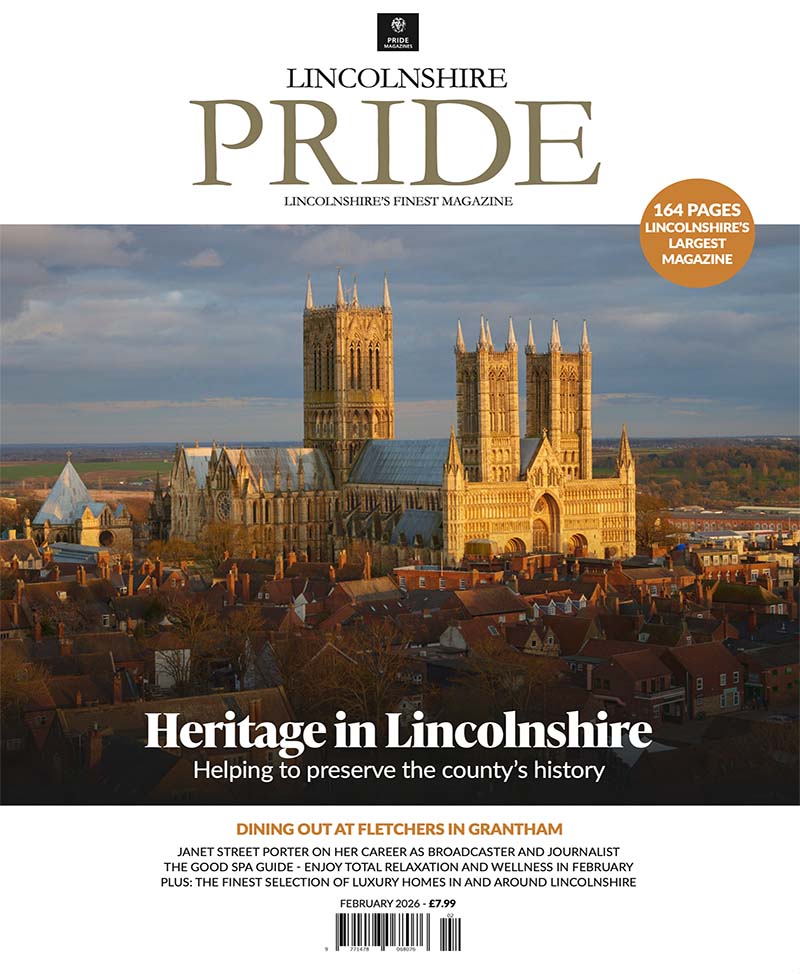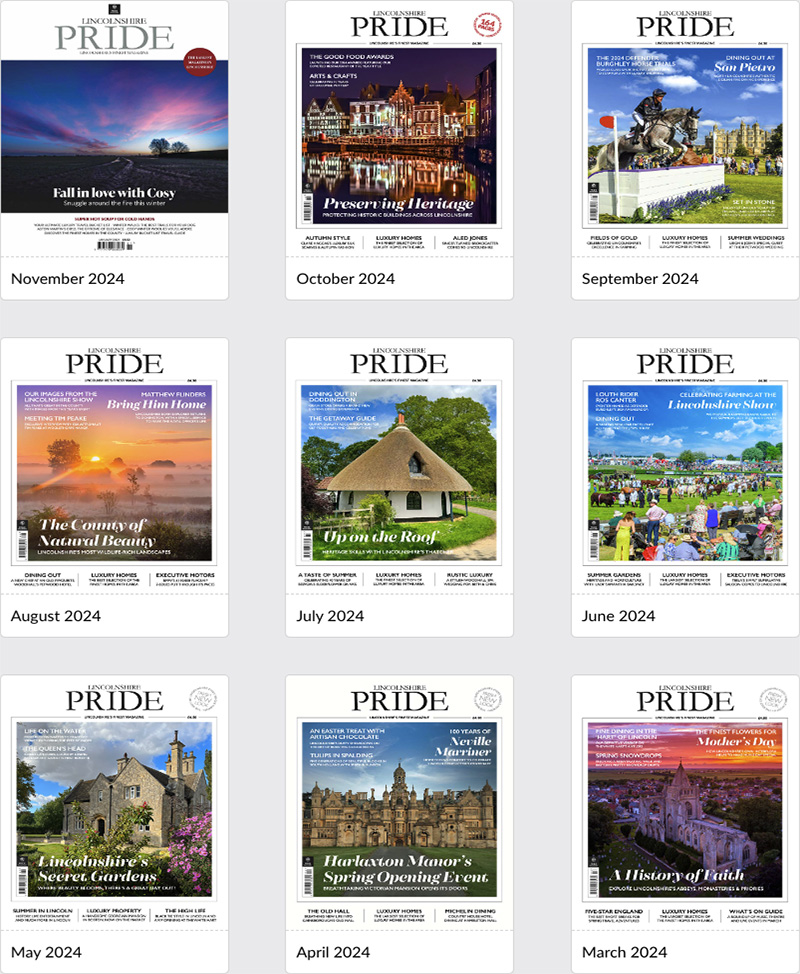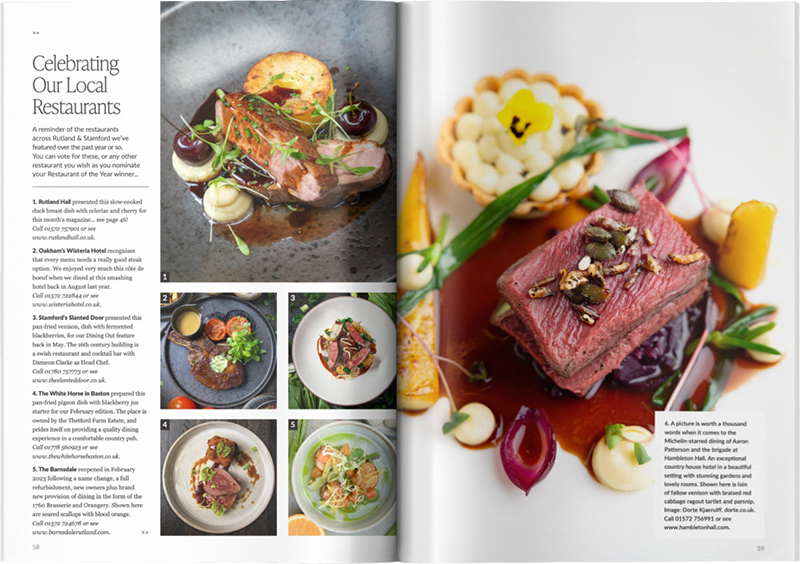
The Lincolnshire Wolds
This month we celebrate the Lincolnshire Wolds with an A-Z of the best features of this areas of outstanding natural beauty
A is for Alford
The town of Alford is home to about 4,000 people, it’s referenced in the Domesday Book and it’s especially popular in May. That’s because, since 1974, it has been home to Alford Craft Market, with about 35 makers working in everything from ceramics, wood, glass and textiles to produce beautiful hand-made products. Established by Heather & Michel Ducos of Alford Pottery, the event takes place from Saturday 24th Monday 26th May this year. Another must-visit landmark is the Grade II* listed Alford Manor House renovated and rethatched 20 years ago, now a volunteer-run museum incorporating the Museum of Rural Life open Tues-Sat from 6th May. Finally, plans to restore Alford Windmill are currently underway with an anticipated 2026 reopening of the site with a new café and education centre, with efforts led by the Alford Windmill Trust. The Grade I listed windmill has seven storeys, it’s 30 metres tall and was created by Sam Oxley in 1837.
B is for Bicycle
Get on your bike and see the Wolds under pedal power. Just One More Bike on Horncastle’s High Street (01522 525527) provides cycle sales and serving. There are six routes on the Wolds Outdoor Festival website, ranging from 10.8 to 25.9 miles, see www.lovelincolnshirewolds.com.
C is for Chalk Streams
Lincolnshire’s chalk streams are among the county’s most precious and fragile natural habitats created where rainwater filters through chalk bedrock to emerge as clear, mineral-rich springs. Globally, chalk streams are exceptionally rare – over 80% are found in England – but Lincolnshire has around 20, including parts of the River Bain, Great Eau and Long Eau. Their cool, oxygenated waters create a perfect habitat for species such as brown trout and water voles. Organisations like the Lincolnshire Chalk Streams Project work alongside local landowners to protect and restore these waterways, ensuring they remain healthy for future generations.
D is for Dawn Chorus
Sunday 4th May is National Dawn Chorus Day. Set your alarm for 5am and listen for the first birdsongs of the day. The day sees two Dawn Chorus Walks at Snipe Dales near Spilsby and Gibraltar Point respectively, both from 5am, incorporating a three mile walk around the Lincolnshire Wildlife Trust-owned reserve. Alternatively, Wednesday 21st May sees a third event taking place at Snipe Dales. Expect the sounds of song thrush, blackbirds, robins and chiffchaffs. See www.lincstrust.org.uk.
E is for Explorer
Sir John Franklin was born in Spilsby in 1786 but set his ambitions a little further than the county of Lincolnshire, joining the Royal Navy at the age of 14. John remained in the service until 1815 and served in the Napoleonic Wars (1803-1815) and War of 1812 between the UK and US. John served on HMS Polyphemus and then on the expedition to circumnavigate Australia under Captain Matthew Flinders. He was also present at the Battle of Trafalgar serving on HMS Bellepheron under Captain John Cooke. Having been knighted in 1829, for his work mapping 1,200 miles of Canada’s coastline, Franklin later embarked on his 1845 ‘Lost Expedition,’ to survey and establish the Northwest Passage where Franklin and his crew were lost. The ship, HMS Terror, was discovered 48 metres underwater in 2016.
F is for Fishing
Caistor Lakes Fishery is offering a Fishing Fun Day on Wednesday 21st May near Claxby. The 38-acre site comprises seven lakes with mirror, common and crucian carp, tench, roach and perch among others. On site there are eight lodges, and three glamping pods, plus a tackle shop and the availability of teas, coffees and baps with Lincolnshire sausage and bacon. www.caistorlakes.co.uk.
G is for Gliding
Ranging from 13 years of age to over 80, there are over 70 members of Kirton in Lindsey-based Trent Valley Gliding Club. Taster sessions start from £65, and as part of the Wolds Outdoor Festival the club is hosting taster sessions throughout the festival on Saturday 24th, Sunday 25th, Monday 26th, Wednesday 28th & Saturday 31st May. See www.tvgc.org.uk or call 01652 648777.
H is for Horncastle
The second largest town in the Wolds after Louth, Horncastle is home to about 7,500 people, and was first settled in the Roman era where a fortified dwelling was created on the River Bain, hence it was previously known as Banovallum – wall on the Bain. Lincolnshire’s Wildlife Trust is headquartered at Banovallum House in the town, and the county’s most celebrated botanist is recognised at the Joseph Banks Centre which comprises a reference library and tribute garden.
I is for Iron Age
The Wolds is home to ancient history, with evidence of Iron and Bronze Age settlements, including barrows and earthworks that hint at early human habitation.
J is for Joseph Banks
The Joseph Banks Society provides a permanent home to the collections of Sir Joseph Banks (1743-1820), who sailed on Endeavour in August 1768 under James Cook to explore Brazil, Tahiti, New Zealand and Australia, and return to Britain with 30,000 plant specimens. Joseph Banks was also a personal friend of King George III, president of the Royal Society for 42 years, and he established the Royal Gardens at Kew. He owned over 400 tenanted farms and thousands of acres in and around his Revesby Abbey estate and was proactive in ensuring the area’s effective drainage for farming, also establishing a benevolent dispensary for those who couldn’t afford medical treatment. He also served as an MP and High Sheriff of Lincolnshire from 1735-1736. Today the centre is home to the Sir Joseph Banks Society, and a reference library, as well as a Herbarium and Tribute Garden. The Joseph Banks Centre is open to the public from Thursday to Saturday, see joseph-banks.org.uk or call 01507 700012.
K is for Kinema in the Woods
The ‘flicks in the sticks’ was created in the grounds of the Victoria Hotel which burnt down on Easter Sunday 1920. The site was purchased by Sir Archibald and Lady Weigall and transformed into a cinema in 1922 with the help of Captain Carleton Cole Allport. The first film it showed, on Monday 11th September 1922 at 7pm, was a Charlie Chaplin film, as the intended film to be shown – The Lion Eaters – failed to arrive. Until 1953 the cinema’s original deckchairs remained. Sound was installed in 1928, with a second screen in 1994 and a third auditorium in June 2019 and screen number four in 2021. Major C. C. Allport ran the cinema for 50 years until 1973, when it passed into the ownership of James Green with Philip Jones taking over, having started working at the cinema in 2004. Around 3,000 films are shown each year, to around 100,000 cinemagoers. See www.thekinemainthewoods.co.uk.
L is for Louth Uprising
The Louth (or Lincolnshire) Uprising took place in autumn 1536 when King Henry VIII’s commissioners arrived in the town to suppress dissent amid the dissolution of the monasteries. An unlikely hero emerged; Captain Cobbler, Nicholas Melton, was so enraged by the destruction of Louth Park Abbey he led a crowd to Legbourne Nunnery to take captive the commissioners and lead the crowd of 30,000 to march on Lincoln. The so-called Pilgrimage of Grace protest was suppressed and the leaders were brutally killed, Henry remarked that Lincolnshire was ‘the most brute and beastly shire of the whole realm.’ Well, he started it…
M is for Montgomery-Massingberd
Sir William Massingberd’s forebears lived in the medieval moated dwelling of Bratoft, but purchased a small manor house from the Gunby family and created the present Gunby Hall in 1700. The family extended the property in 1810, 1873 and 1898. The extensions were probably part-funded by the sale of some of Gunby Hall’s estate located east towards the coast to the Earl of Scarborough to develop the coastal resort of Skegness. Diana Langton married Archibald Montgomery and the couple became known as the Montgomery-Massingberds. The couple kept the property until 1944 when they gifted it to the National Trust. Today the property is set in 100 acres of parkland, surrounded by 1,500 acres of farmed estate. The Grade I listed house house has 42 rooms, and Gunby is known for its carriage house and stables, and its walled garden with 50 variety of apples.
N is for Nature Reserve
The Lincolnshire Wildlife Trust is headquartered in Horncastle, at Banovallum House. The Grade II listed house was built in 1790 and extended in 1850. Set in 2.5 acres the site comprises a wildlife garden, walled garden and 200m of riverbank. The site is open to visitors and has half a kilometre of limestone paths plus a number of different habitat types for visitors to enjoy from April to August. Among the charity’s 100 reserves, is Snipe Dales near Spilsby with its mix of Corsican pine woodland and its wet valleys, grassland and scrub in the nature reserve. Snipe Dales has three waymarked trails, and as part of the Wolds Outdoor Festival there will be a Snipe Dales Open Day with family activities like den building and pond dipping on Saturday 24th May from 2pm. See www.lincstrust.org.uk.
O is for Outstanding Natural Beauty
Areas of Outstanding Natural Beauty were first created in 1949, and much of the Wolds was designated as an AONB in 1973. Today the designation is as one of Britain’s National Landscapes. The Lincolnshire Wolds Countryside Service works in conjunction with its Joint Advisory Committee to promote the sustainable development of the area, which covers around 220 square miles.
P is for Poet
Alfred, Lord Tennyson was born in 1809 at Somersby Rectory and later educated at Trinity Cambridge before publishing his first work in 1830. He’s best known for Charge of the Light Brigade and In Memoriam A.H.H which was a comfort to Queen Victoria as she mourned the loss of Prince Albert. Gunby Hall is referenced as his ‘haunt of ancient peace.’
Q is for Quaint Villages
The Wolds is home Tealby & Walesby with their populations of 540 and 220. They are often regarded as being the most attractive villages in the Wolds, in addition to the area’s market towns; Alford, Caistor, Horncastle, Louth, Market Rasen and Spilsby
R is for Racecourses
Market Rasen Racecourse is 101 years old and is located where three hunts – the Brocklesby, Southwold and Burton – converge. The course is one and a quarter miles and the track stages 20 fixtures each year. Known for live music too, look out for Scouting for Girls on 13th June and the Summer Plate Ladies Day on 19th July.
Louth’s Cadwell Park has been home to one of the fixtures in the British Superbike Championships for 25 years. The track was created in 1934 by Mansfield Wilkinson for his own sons’ motorcycle racing interest. The full circuit established in 1961 is 2.1 miles in length and has 18 turns. Owned by Jonathan Palmer’s MotorSport Vision, this month as part of the Wolds Outdoor Festival you can cycle on or enjoy a guided walk of the track on Friday 30th May.
S is for Smith
Captain John Smith was born in Willoughby near Alford in 1580 and helped establish the first permanent English colony in North America, a decade before the Pilgrim Fathers set sail.
T is for Trees
The Lincolnshire Wolds features vast area’s of woodland including Alford’s Rigsby Wood, Legbourne Wood outside Louth. Willoughby Woods north of Gunby and Market Rasen’s Willingham Woods.
U is for Ulceby Grange
Since 1917, Ulceby Grange has been home to F W Read & Son. And today, brothers Simon & Richard Jones are the fourth generation of farmers with 230 Holstein cows. In 1992, having visited various dairies in the South West, Simon returned home and created the first batch of Lincolnshire Poacher cheese. Today the farm is home to one of the best-loved local cheese varieties with vintage and smoked varieties. Meanwhile, at Osgodby, Cote Hill near Market Rasen’s Michael and Mary Davenport produce six artisan cheeses, Cote Hill Red, White, Yellow, Blue, Cote Hill Lindum, and their newest award-winning cheese, Snowdrop.
V is for Vineyard
The 3,000 acre South Ormsby Estate is equidistant from Spilsby & Louth and comprises four villages and 150 acres of parkland. It was established in 2016 as a conservation estate and as well as its Lincoln Red beef and poultry, the estate has its own vineyard. The first harvest of its grapes is anticipated in October with Pinot Noir & Chardonnay among its seven varieties. The plan is to create premium wines under the Massingberd-Mundy label alongside a range of small-batch gins. Jon & Jan Thornes became the custodians of South Ormsby Estate and seek to bring together a wide range of traditional country skills to ensure the future of the estate.
W is for Watermill
Claythorpe Watermill was rebuilt following a fire in 1890, and retains its working turbine. The village of Alvingham also has a working 17th watermill, and it’s believed there has been a mill on the site since 1155.
X is for ‘X-hibition’
As part of the Wolds Outdoor Festival, Tathwell’s art exhibition returns on Sat 24th, Sun 25th and Mon 26th May, at St. Vedast’s Church Tathwell, Louth.
Y is for Yoga
Join a yoga session on the lawn with afternoon tea at Top Farm, Lissington, see www.marketrasenholistichub.com.
Z is for Zoo
The Wolds Wildlife Park is home to everything from Alpacas to Zebras, and from lions and tigers to llamas and tortoises. Open from April to October from 10am, see www.woldswildlife.co.uk.
To see out feature in full, view the May edition of Lincolnshire Pride at
Wolds Outdoor Festival 2025
Saturday 17th May: Outdoor Festival & Activity Day Gunby Hall based launch of the festival.
Saturday 18th May: Vineyard Tour & Mini Tasting South Ormsby, from 1pm, booking required.
Wednesday 21st May: Dawn Chorus Walk, Snipe Dales from 5am, 3 miles.
Wednesday 21st May: Fishing Fun Day, Introduction to angling in Caistor, 8am.
Wednesday 21st May: Come and Try Orienteering, Based at Swallow Vale, 3.30pm, booking necessary.
Thursday 22nd May: Croquet on the Lawn, Based at Alford Manor House, 10.30am.
Saturday 24th to Monday 26th May: Annual Tathwell Art Exhibition, From 11am, Tathwell’s St Vedasts.
Sunday 25th May: Gliding Taster Sessions Various times, booking necessary.
Thursday 29th May: Racecourse Tour, Guided walk around Market Rasen Racecourse, 10am, booking required.
Thursday 29th May: In the Footsteps of Tennyson Guided walk from Bag Enderby, 1pm, 3.5 miles.
Friday 30th May: Walk/Cycle Round Cadwell Park, Guided walk or the chance to cycle around the circuit, from 5.30pm, two miles.
Sunday 1st June: Celebrating the Outdoors, series of events at Stourton Estates, from 10am.
Sunday 1st June: Gin Distillery Tour, South Ormsby, 10am, 3 miles.
These are just some of the 100 events taking place as part of The 2025 Wolds Outdoor Festival. For addresses/details see www.woldsoutdoorfestival.com.
See our full feature in this month’s Lincolnshire Pride magazine, at https://www.pridemagazines.co.uk/lincolnshire/view-magazines?magazine=May-2025






